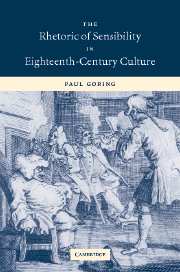Book contents
- Frontmatter
- Contents
- Preface
- Introduction
- 1 Spectacular passions: eighteenth-century oratory and the reform of eloquence
- 2 Bodies on the borders of politeness: ‘Orator Henley’, Methodist enthusiasm, and polite literature
- 3 Thomas Sheridan: forging the British body
- 4 The art of acting: mid-century stagecraft and the broadcast of feeling
- 5 Polite reading: sentimental fiction and the performance of response
- Epilogue
- Bibliography
- Index
- References
Bibliography
Published online by Cambridge University Press: 22 September 2009
- Frontmatter
- Contents
- Preface
- Introduction
- 1 Spectacular passions: eighteenth-century oratory and the reform of eloquence
- 2 Bodies on the borders of politeness: ‘Orator Henley’, Methodist enthusiasm, and polite literature
- 3 Thomas Sheridan: forging the British body
- 4 The art of acting: mid-century stagecraft and the broadcast of feeling
- 5 Polite reading: sentimental fiction and the performance of response
- Epilogue
- Bibliography
- Index
- References
- Type
- Chapter
- Information
- The Rhetoric of Sensibility in Eighteenth-Century Culture , pp. 202 - 213Publisher: Cambridge University PressPrint publication year: 2004

